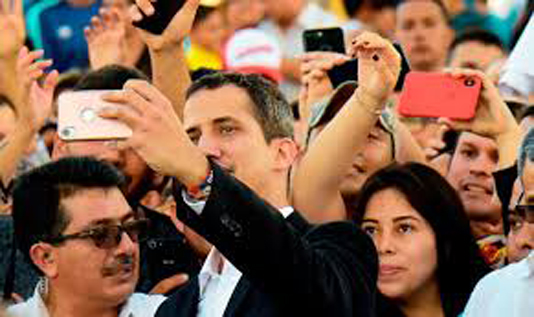CARACAS, March 4, 2019 (BSS/AFP) – Opposition leader Juan Guaido called for
mass protests across Venezuela against President Nicolas Maduro on Monday as
he announced his return after a week touring Latin American allies.
His reappearance in Venezuela would pose an immediate challenge to the
embattled Maduro, who will have to decide whether to arrest him for defying a
travel ban — thereby provoking strong international condemnation — or allow
him to enter unmolested, which would undermine his authority, analyst say.
“I’m announcing my return to the country. I am calling on the Venezuelan
people to mobilize all over the country tomorrow at 11:00 am (1500 GMT),”
Guaido wrote Sunday on Twitter.
Guaido, who has been recognized by more than 50 countries as Venezuela’s
interim president, did not say how or when he would return, though
speculation is rife that a flight from the Colombian capital Bogota to
Caracas is the most likely route.
However, its possible that he plans to slip across the border with Colombia
in the same way he left Venezuela, claiming on that occasion that he had help
from Maduro’s military.
In a second tweet Guaido said he would provide an account of his tour and
announce the opposition’s “next actions” on social networks at 8:30 pm (0030
GMT Monday).
Guaido held talks in Salinas – a coastal resort town west of Guayaquil – on
Saturday with President Lenin Moreno, and met with Venezuelan refugees.
On Sunday around noon he flew out of Salinas without revealing his
destination.
– ‘Must return to Venezuela’ –
Defying a Venezuelan government travel ban, Guaido slipped across the
border to Colombia on February 23 in an attempt to escort in truckloads of
international humanitarian aid. While in Colombia he met with visiting US
Vice President Mike Pence.
The 35-year-old political newcomer then traveled to Brazil, where he met
the country’s new right-wing president, Jair Bolsonaro, and on Friday
traveled to Paraguay and Argentina.
In a poke at Maduro during his trip, he said he was invited to visit Chile
later this month.
Guaido, who heads the opposition-led National Assembly, stunned the world
on January 23 when he proclaimed himself Venezuela’s acting president after
the legislature declared Maduro a usurper and illegitimate over his May 2017
re-election, which was widely criticized as fraudulent. Maduro’s new term in
office began on January 10.
Guaido wants to oust Maduro and set up a transitional government ahead of
new elections.
Guaido “must return to Venezuela and continue to press internally, as the
international support is enormous,” Eufracio Infante, 64, a Venezuelan lawyer
and history teacher, told AFP.
“We are facing a very delicate situation and every minute we are
approaching an outcome we hope will not be catastrophic,” he said.
Maduro — who retains the support of Venezuela’s powerful military —
enjoys strong support from Russia, which accuses Washington of
interventionism, and China, which is concerned over the fate of billions of
dollars in loans to Maduro’s regime.
The socialist president warned last week that Guaido should “respect the
law” and would have to “face justice” if he returns to the country.
Guaido said last week he intended to return to Venezuela “despite threats”
to arrest him. The United States and other allies have expressed concern for
his safety.
“The challenge has gone very far,” political analyst Luis Salamanca told
AFP. “If he comes in and they stop him, it will generate strong internal
reaction as well as internationally. Maduro is at permanent risk.”
European Union Foreign Policy chief Federica Mogherini warned on Saturday
that any measure that would put at risk Guaido’s “freedom, safety or personal
integrity would represent a major escalation of tensions and meet the firm
condemnation of international community.”
“Guaido has grown so much politically that they haven’t been able to touch
him, in the traditional ways … which is to put him in prison or force him
to flee the country, harass him,” said Salamanca.
Separately, Chile’s President Sebastian Pinera sharply criticized UN rights
commissioner Michelle Bachelet – Chile’s president 2006-2010 and 2014-2018 –
on Sunday for failing to condemn Maduro for human rights violations.
Pinera, a Chilean billionaire elected president for the second time in
2017, is a key supporter of Guaido, and joined the Venezuelan opposition
leader in Cucuta, Colombia last weekend in a failed attempt to send
international humanitarian aid into Venezuela.
Pinera said in an interview published in the El Mercurio newspaper that
Bachelet’s predecessor at the UN, Zeid Ra’ad Al Hussein of Jordan, “was much
clearer, more categorical in condemning human rights abuses.”



